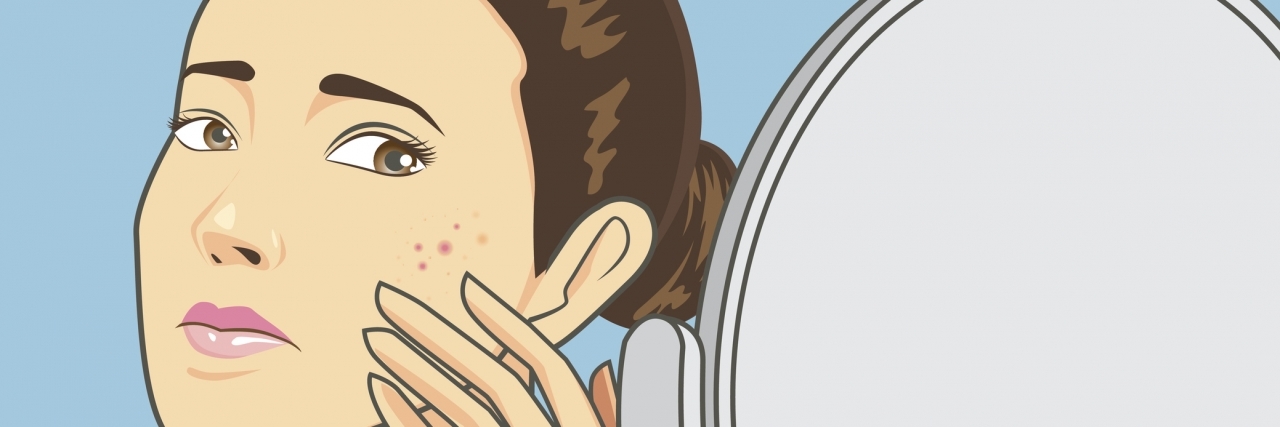The Ugly Truth About Feeling Ugly: Living With Body Dysmorphic Disorder
I look in the mirror as I begin to get ready for the day.
“Disgusting,” I think to myself.
I look at all of my flaws and criticize myself on my looks. I then proceed to spend an hour doing my makeup trying my best to cover those flaws. This is a typical morning for me living with body dysmorphic disorder (BDD).
Most people have insecurities on their looks and would like to change certain things about their appearance, but BDD goes a lot deeper than feeling self-conscious. Those suffering with body dysmorphia are consumed with obsessive thoughts about a perceived defect of their appearance. The obsessive thoughts consume the sufferers’ mind for hours a day and lead to various compulsions to hide or fix the flaws. The obsessive thoughts can focus on things such as freckles, acne, too much or lack of facial hair, breast size or anything else someone perceives as a flaw on their body; these lead to compulsions such as skin picking, excessive grooming and constantly looking in the mirror, among others.
Every morning I look in the mirror and hate what I see.
While I have many insecurities, my biggest issue stems from blemishes on my face. I go through great lengths to cover my blemishes, spending about an hour applying makeup — usually two coats of foundation and a ton of covering with a cover-up stick. Each time I leave the house throughout the day, I have to redo
my makeup, typically about three or four times. I often fear people may think I’m shallow for how much makeup I wear and because I can never leave the house without wearing it. In reality, the reason I wear so much is because I cannot stand how I look without it. I struggle immensely with a compulsion of skin picking, causing bright red spots which eventually cause terrible scarring.
When my breakouts are at their worst and my excessive skin picking causes many red, sore blotches, I don’t want to face the world. There are times I pass up on social invitations because I am so ashamed of my looks and do not want others to look at me. When I have to work, I try to keep my head titled down when speaking to customers to shield them from my ugliness. The thoughts about my flaws are constantly badgering me, I am continuously wondering how awful I look. Whenever I am speaking with someone I keep telling myself they are staring at my flaws and must be thinking to themselves how they are disgusted by me. I constantly look at myself in the mirror to analyze my skin, and every time I hear myself saying, “See, you are so hideous.” There is an ongoing struggle with self-hate in my mind.
They say you are your own biggest critic. When you suffer from body dysmorphia, there is nothing closer to the truth. It is possible to conquer this disorder with forms of therapy. Knowing you deal with this and being able to put a name to the obsessive thoughts will help in your recovery.
I have been fighting the monsters of depression and anxiety for years, and I am embarking on my journey to beat this disorder and achieve self-love.
While many mental illnesses are more commonly being brought into the public eye and more openly spoken about, BDD is not quite at that point. The main reason for this is likely that the disorder is just simply not well known. It goes undiagnosed in many cases, which can be due to a person not being comfortable enough to talk about their disgust in their flaws, downplaying the seriousness of their obsessive thoughts or even being misdiagnosed by a psychologist as having a form of OCD or depression, as the symptoms of these are usually directly correlated with symptoms of body dysmorphia. BDD is also extremely similar to eating disorders in the aspect of the obsessions and compulsions, but it is important to know BDD is the obsession of a specific part of the body or characteristics of the body.
Body dysmorphia is definitely something that needs to be paid more attention to and treated as any other mental disorder. The affect it can have on a person is detrimental to their mental well-being; some may continuously get plastic surgery to fix their perceived flaws, and some may even turn to suicide. If you are suffering from BDD, I urge you to seek treatment. Everyone should feel beautiful and be able to love themselves.
If you or someone you know needs help, see our suicide prevention resources.
If you need support right now, call the Suicide Prevention Lifeline at 1-800-273-8255.

